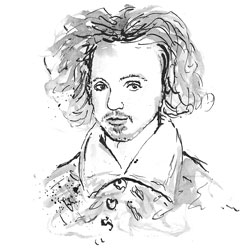Christopher Marlowe
Christopher Marlowe was probably born in 1563 or 1564, the son of a Kent shoemaker. The family were not well off: he attended King's School Canterbury on a scholarship and when he went to Corpus Christi College Cambridge in 1580 it was also on a scholarship, for students intending to study divinity. His bills for food and drink from the College Buttery show that, beginning in 1585, he was often away, and had more spending money than before. This, together with a Privy Council note of 1587 discussing his stay at the English Catholic college in Rheims, suggests that he may have been working for the government as a spy. While he was at Cambridge he began to translate Greek and Latin poetry and may also perhaps have written his play Dido Queen of Carthage (published in 1594).
Marlowe graduated in 1587 and moved to London, where he began writing plays: the two parts of Tamburlaine the Great (performed 1587); The Jew of Malta (performed 1592); The Massacre at Paris (1593); Edward II (printed 1594); and Doctor Faustus (first printed 1594 but probably perfomed earlier.) He also wrote poetry, including 'The Passionate Shepherd' and Hero and Leander. In 1589 Marlowe was arrested for his part in a brawl when a man died. He was arrested again in the Netherlands for counterfeiting in 1592, and in the same year in London he was taken to court for two separate incidents (one assault). In the last months of his life, he was repeatedly accused of being an atheist and a traitor. By May 1593 he was forced to report to the Privy Council daily and that month the Council received a note alleging a number of heresies and treasons against him. He was stabbed to death on 30th May in a tavern in Deptford: according to the inquest, because of a dispute about the bill. He was Shakespeare's most important dramatic predecessor, and in numerous works Shakespeare is sometimes thought to be responding to Marlowe. For example, Richard II tells the story of a deposed king, as does Edward II; Macbeth features a bargain with evil powers, as does Doctor Faustus. His short, violent, and mysterious life, combined with his complex plays, which always seem to challenge expectations, continue to fascinate readers (and conspiracy theorists) today.
Textual scholarship on Doctor Faustus has stressed the importance of major discrepancies between the two early editions of Marlowe's play; it's crucial to read from an edition that provides both the so-called A- and B-texts. An accessible and reliable paperback edition edited by David Bevington and Eric Rasmussen is available from the Oxford World's Classics series. This edition also includes texts of both parts of Tamburlaine, Marlowe's bio-epic of the rise and fall of the ruthless tyrant of Samarkand, and The Jew of Malta, a fascinating, generically elusive, and disturbing chronicle of the successful defence of Malta against Ottoman invaders. If you are looking for an edition of Doctor Faustus that provides more focused critical and historical notes, and an introduction, try Ros King's edition of the play for the New Mermaids series (published by Methuen).
The resources for Marlowe on this site focus on his most controversial play, Doctor Faustus. They place it in relation to religious and political ideas of the time, and consider both its origins and its afterlife. Using the menu on the left you can also find your way to a film, Glutted of This, a theatrical performance inspired by, and reflecting on, the play.
